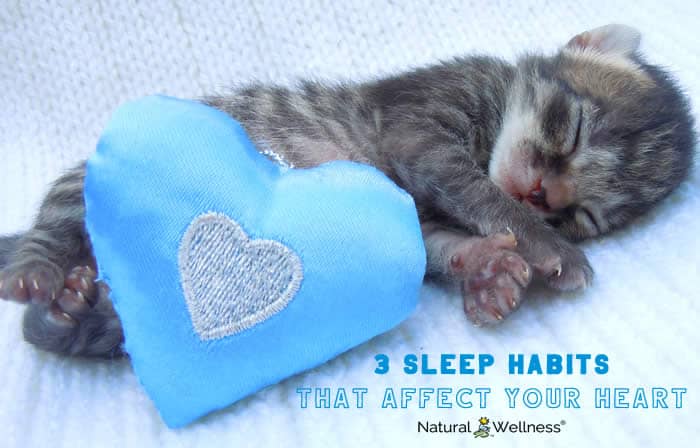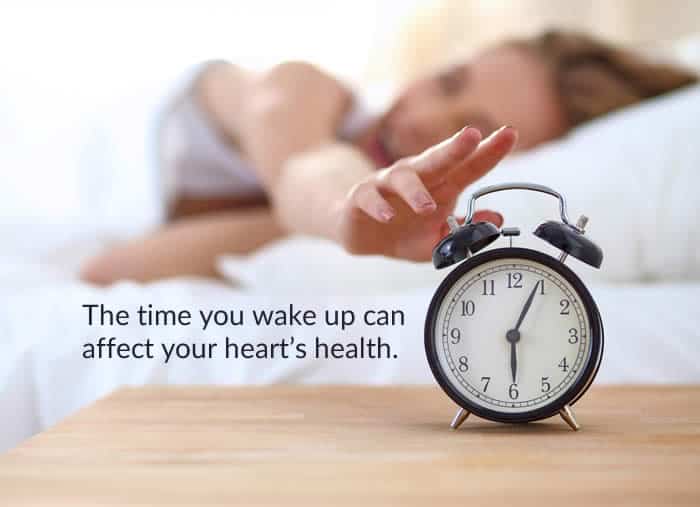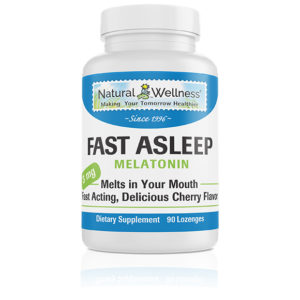

It’s long been known that getting a solid night’s sleep reduces stress levels, improves mood, boosts immunity, and promotes good decision-making. (1) However, several recent studies have found that your sleep habits can also affect your heart’s health.
These habits include:
- when you go to bed
- when you wake up
- and how much sleep you get overall.
Bedtime and the Heart
In a study published on November 9, 2021, a device was used to collect the sleep habits of more than 88,000 subjects over the course of 7 days. (2) Then it was noted whether these individuals had any type of cardiovascular event over the next 5 to 6 years.
One of the things these researchers were interested in learning was if there was a connection between the time people went to sleep and their risk of cardiovascular incidents.
After accounting for other factors, it was noted that those who went to sleep between 10 pm and 11 pm had the lowest risk of a cardiovascular event. Going to bed much later increased this risk, as did hitting the sack “very early”— especially for females.
Best Wake-Up Times for Heart Health
What about wake-up times?
This was the question asked by researchers in a study published in the Journal of the American Heart Association on March 5, 2021. (3) This piece of research involved 4,765 participants who were followed around 11 years.

Researchers found that subjects who slept past 8 am on weekdays had a higher risk of congestive heart failure than those who woke up before 6 am. This study also reinforced the higher risk of heart issues for those with bedtimes later than 11 pm.
Getting the Right Amount of Sleep
Just as bedtime and wake-up time can impact heart health, so too can total sleep time. In another long-term study, this one involving 4,994 subjects who were followed for more than a decade, it was found that getting less than six hours of sleep per night increased the individuals’ risk of a cardiovascular incident by 29%. (4)
The National Sleep Foundation recommends that most adults get between 7 and 9 hours of sleep per night for optimal health. (5) Kids need more, with a recommendation of 8 to 10 hours for teens, and up to 14 to 17 hours daily for newborns.
Improving Your Sleep for Maximum Heart Health
Studies involving sleep and heart health highlight the importance of going to bed at a good time, waking up at a good time, and getting enough total sleep for keeping your heart in top shape.
If you struggle with getting good sleep, creating a relaxing bedtime ritual may help. What can also help is keeping a consistent sleep schedule, turning off your electronics at least a half-hour before bedtime, and limiting late-day caffeine and alcohol intake, according to the American Academy of Sleep Medicine. (6)
Melatonin
Natural Wellness also offers a sleep aid called Fast Asleep. Fast Asleep contains 3 mg of melatonin per lozenge. Melatonin helps control the body’s circadian rhythm, thereby playing an important role in the sleep process.
The human body produces melatonin naturally, though its production can be hindered by things such as exposure to light. (7) This can create challenges for shift workers, people who travel through different time zones, and people who spend a lot of time with light-emitting electronic devices.
A review of the research reveals that melatonin supplementation can assist with improving the onset, duration, and quality of sleep with “no obvious short- or long-term adverse effects.” (8) So, it may just help you if you struggle with getting and staying to sleep, providing a more peaceful and restful night’s sleep.





